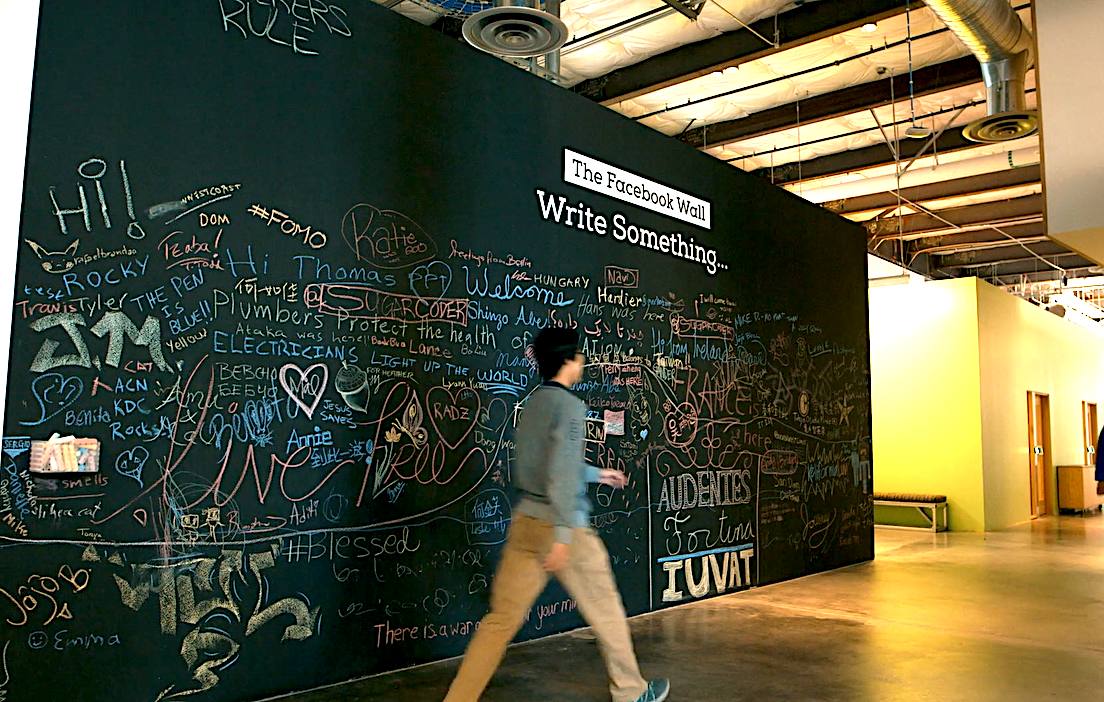Two different kinds of activities are being blurred by using the same word, writes Jonathan Cook. And a lot hangs on how we use the term.

Ideawall at Facebook, 2016. (InVision, CC BY 3.0, Wikimedia Commons)
By Jonathan Cook
Jonathan—Cook.net
 The enthusiasm with which much of the media and political establishment have characterised Frances Haugen as a “Facebook whistleblower” requires that we pause to consider what exactly we think the term “whistleblower” means.
The enthusiasm with which much of the media and political establishment have characterised Frances Haugen as a “Facebook whistleblower” requires that we pause to consider what exactly we think the term “whistleblower” means.
Haugen has brought to the surface a fuzziness in what many of us understand by the idea of whistleblowing.
Even Russell Brand, a comedian turned soothsayer whose critical and compassionate thinking has been invaluable in clarifying our present moment, joined in the cheerleading of Haugen, calling her a “brave whistleblower.”
But what do Brand and other commentators mean when they use that term in relation to Haugen?
Manipulated Feeds
There are clues that Haugen’s “whistleblowing” may not be quite what we assume it is, and that two different kinds of activities are being confused because we use the same word for both.
That might not matter, except that using the term in this all — encompassing manner degrades the status and meaning of whistleblowing in ways that are likely to be harmful both to those doing real whistleblowing and to us, the potential recipients of the secrets they wish to expose.
 The first clue is that there seems to be little Haugen is telling us that we do not already know – either based on our own personal experiences of using social media (does anyone really not understand yet that Facebook manipulates our feeds through algorithms?) or from documentaries like The Social Dilemma, where various refugees from Silicon Valley offer dire warnings of where social media is leading society.
The first clue is that there seems to be little Haugen is telling us that we do not already know – either based on our own personal experiences of using social media (does anyone really not understand yet that Facebook manipulates our feeds through algorithms?) or from documentaries like The Social Dilemma, where various refugees from Silicon Valley offer dire warnings of where social media is leading society.
We did not call that movie’s many talking heads “whistleblowers,” so why has Haugen suddenly earned a status none of them deserved? (You can read my critique of The Social Dilemma here.)
My latest: Netflix's The Social Dilemma, featuring Silicon Valley whistleblowers, seeks to explain how Google and Facebook have pushed our societies to the brink of collapse.
The alarm is justified – but the film is able to tell only half the story https://t.co/YZhrcFx3P8
— Jonathan Cook (@Jonathan_K_Cook) September 25, 2020
But the real problem with calling Haugen a “whistleblower” is indicated by the fact that she has been immediately propelled to the center of a partisan political row – yet another example of tribal politics that have become such a feature of the post—Trump era.
Democrats see Haugen as a hero, blowing the whistle not only on overweening tech corporations that are taking possession of our children’s minds and subverting social solidarity but that are also fueling dangerous Trumpian delusions that paved the way to January’s riot at the Capitol building.
Republicans, by contrast, view Haugen as a Democrat partisan, trying to breathe life into a liberal conspiracy theory — about Republicans. In their view, she is bolstering a leftwing “cancel culture” that will see wholesome conservative values driven from the online public square.
Deep, Dark Dungeon
Let’s set aside this tribalism for the moment (we will return to it soon) and consider first what we imagine whistleblowing involves.
Haugen has indeed used her position as a former employee in a hyper-powerful corporation — the globe-spanning tech firm Facebook — to bring to light things that were supposed to be hidden from us.
That meets most people’s basic definition of a whistleblower.
But it is significant that whistleblowers are taking on institutions far more powerful than they are. Those institutions will try to fight back, and do so in the dirtiest ways possible when their core interests are under threat. Whistleblowers typically face a cost for what they do precisely because of the position they have in relation to the institutions they are trying to hold to account.
That is all too evident in the treatment of the bravest whistleblowers and those who assist them. Some are prosecuted, jailed and near bankrupted (Chelsea Manning, John Kiriakou, Craig Murray), others are driven into exile (Edward Snowden), while the unluckiest are vilified and disappeared into the modern equivalent of a deep, dark dungeon (Julian Assange).
My latest: The reality of Assange’s long years of persecution is far worse than even the picture painted by a new investigation that shows a thuggish, power-mad CIA bent on vengeance for his role in exposing its crimes https://t.co/iZnoO1N3QE
— Jonathan Cook (@Jonathan_K_Cook) September 30, 2021
It is by virtue of their treatment that there can be little doubt all these people are whistleblowers. It is because they are telling us secrets those in power are determined to keep concealed that they are forced to go through such terrible ordeals.
We might go so far as to argue that, as a rule of thumb, the more severe the penalty faced by a whistleblower, the greater threat they pose in bringing to light what is supposed to remain forever in the dark.
Hidden Secrets
One problem with thinking of Haugen as a whistleblower is that it is far from clear that she has paid — or will pay — any kind of price for her disclosures.
And maybe more to the point, it seems that when she turned to CBS’ 60 Minutes to help her “blow the whistle” on Facebook she knew she would have powerful allies — right up to those occupying the White House — offering her protection from any meaningful fallout from Facebook.
“Facebook, over and over again, has shown it chooses profit over safety,” says Facebook whistleblower Frances Haugen. She believes the federal government should impose regulations and plans to testify before Congress this week. https://t.co/YoKIyorZzu pic.twitter.com/RWlk9QOwZu
— 60 Minutes (@60Minutes) October 3, 2021
If reports are to be believed, she has already been signed up with the public relations firm that has represented Jen Psaki, the White House spokeswoman.
The support Haugen is being offered, of course, does not mean that she is not drawing attention to important matters. But it does mean that it is doubtful that “whistleblowing” is a helpful term to describe what she is doing.
This is not just a semantic issue. A lot hangs on how we use the term.
A proper whistleblower is trying to reveal the hidden secrets of the most powerful to bring about accountability and make our societies more transparent, safer, fairer places. Whistleblowing seeks to level the playing field between those who rule and those who are ruled.
At the national and international level, whistleblowers expose crimes and misdemeanors by the state, by corporations and by major organizations so that we can hold them to account, so that we, the people, can be empowered, and so that our increasingly hollow democracies gain a little more democratic substance.
But Haugen has done something different. Or at least she has been coopted, willingly or not, by those same establishment elements that are averse to accountability, opposed to the empowerment of ordinary people, and stand in the way of shoring up of democratic institutions.
Competing Visions

“People on street in motion blur.” (Sascha Kohlmann, Flickr, CC BY-SA 2.0)
To clarify this point, we need to understand that in our societies there are two kinds of ways power can be challenged: from outside the establishment, the power structure, that dominates our lives; or from within it.
These are two different kinds of activity, with different outcomes — both for the whistleblower and for us.
Please Support CN’s Fall Fund Drive!
Scholars often refer to “elites” rather than one monolithic establishment to better capture the nature of power. We, as outside observers, often miss this important observation.
The establishment, in fact any major organization, is likely to have at least two major competing groups within it, unless it is entirely authoritarian. (Even then, leaders of dictatorial regimes have to worry about plots and coups.)
There are rival visions of what the organization — or state — should do, how best to manage its interests and maximize its success or profits, and how best to shield it from scrutiny or reform. Those inside the organization are united in their motivation to maintain their power, but they are often divided over how that can best be achieved.
In Western societies, these opposing visions typically revolve around ideas associated with liberal and conservative values. In the case of states, that simple binary is often reinforced by electoral systems that encourage two parties, two political choices, two sets of values: Democrats versus Republicans; Labour versus Conservatives; and so on.
It is part of the establishment’s success — the way it preserves its power — that it can present these two choices as meaningful.
But in reality, both choices support the status quo. Whichever party you vote for, you are voting for the same ideological system — currently a neoliberal version of capitalism. However you cast your vote, the same set of elites stay in power, with the same kinds of corporations funding them, and with the same revolving door between the political, media and business establishments.
Elite Battles
So how does this relate to Haugen?
Our “Facebook whistleblower” is not helping to blow the whistle on the character of the power structure itself, or its concealed crimes, or its democratic deficit, as Manning and Snowden did.
She has not turned her back on the establishment and revealed its darkest secrets. She has simply shifted allegiances within the establishment, making new alliances in the constantly shifting battles between elites for dominance.
Which is precisely why she has been treated with such reverence by the 60 Minutes program and other “liberal” corporate media and feted by Democratic Party politicians. She has aided their elite faction over a rival elite faction.
Manning and Snowden challenged the very basis on which our societies are organized. They hurled a big rock into the placid lake that is the ideological background to our lives.
Manning exposed the elite consensus in support of voracious war industries determined to control the resources of others at a terrible cost in human lives and blow to the ethical values to which we pay lip service. Snowden, meanwhile, showed that ultimately these same elites – whether Democrats or Republicans are formally in charge – view us as the enemy, surveilling us in secret to ensure we can never organize to replace them.
Both Manning and Snowden threatened the national security state, and were vilified by both sides of the aisle for doing so.
What Facebook Is
May 15, 2019: House Speaker Nancy Pelosi greets U.S. President Donald Trump during ceremony honoring law enforcement officers killed in the line of duty. (Shane T. McCoy/U.S. Marshals)
Haugen’s relationship to power is different, and we can make sense of it only by understanding what Facebook is.
This tech giant stands at the center of a major elite battle: between old media and new media; between traditional, analogue corporate power and new models of digital corporate power; between elites that benefit from unregulated “free” markets and those who gain their power from regulation.
Within Facebook itself there are battles: between those who hold to its original ambition to monetize an endlessly connected world where we all get an online loudspeaker, and those who want the platform to become even more deeply embedded within the national security state and serve its purposes.
This is not a simple Democrat versus Republican divide. Facebook and other social media platforms — with their raucous effects on public discourse and their ability to amplify non-elite voices — have had a polarizing impact that has cut across the usual left-right lines.
The complex skirmishes among elites have been further complicated by the increasingly libertarian, free-market impulses within the current Republican Party establishment (in tension with the right’s traditional focus on conservative and family values) and the “big government,” identity politics-obsessed impulses within the current Democratic Party establishment (in tension with the left’s traditional attachment to more liberal, free speech values).
Paradoxically for many of us, Democratic elites often appear more visibly wedded to the national security state — and have stronger allies within it – than Republican elites. Just ask Donald Trump and Nancy Pelosi how they respectively feel about the intelligence agencies.
Silicon Valley elites similarly straddle this divide, with some in favor of profiting from an online free-for-all and others in favor of tight regulation.
Secret Algorithms

Building that says “Hacker One” inside FaceBook’s Menlo Park, California, headquarters, 2019. (Shreyas Minocha, CC BY-SA 4.0, Wikimedia Commons)
Haugen’s “whistleblowing” on Facebook is simply her going public that she favors one side of this elite competition over the other. She is not batting for us, the public, she is assisting one set of elites against another set of elites.
Which is precisely why her message to 60 Minutes and Congress reduces to a simple one: more regulation of social media, more use of secret algorithms, more darkness rather than light.
Those politicians who want greater regulation of social media platforms to keep out independent voices and critical thinking; the billionaires who want to reassert their gatekeeping media power against the tech upstarts; the Silicon Valley visionaries who want to poke their digital tools deeper into our lives have all found an ally in Haugen.
She does not threaten the status quo, a status quo that continues to plunder the planet’s finite resources to exhaustion, that wages endless resource wars around the globe, that is driving our species to the edge of extinction. No, she is upholding a status quo that will ensure the same psychopaths remain in power, their crimes even further out of view.
That is why Haugen is not really a whistleblower, brave or otherwise. Because there is a price to pay for standing up for truth, for humanity, for life. She is simply shoring up one elite path of several to more corruption, more deceit, more suffering, more death.
Jonathan Cook is a former Guardian journalist (1994—2001) and winner of the Martha Gellhorn Special Prize for Journalism. He is a freelance journalist based in Nazareth. If you appreciate his articles, please consider offering your financial support.
This article is from his blog Jonathan Cook.net.
The views expressed are solely those of the author and may or may not reflect those of Consortium News.
Please Support Our
Fall Fund Drive!



Yep. Jonathan Cook nails it again. Others have seen through this “whistleblower,'”as well, and have already written enough to send her packing. But her trajectory presents a good opportunity to dissect the pattern we often see coming from elite circles: seemingly ‘shocking’ revelations (truths we already know,) splashy headlines, “serious” journalists staging interviews, lengthy columns about importance of the (stage-managed) source’s story, Congressional testimony(!)…then it’s on to the dirty business of using the cover given by the ensuing outrage (real or conjured) to making things worse for the vast majority and far better for a tiny few. And while a few individuals with integrity do the real work of journalism in real time to shed light on the con, the psychopaths who stage the event move on, with bigger budgets, more authority, and more power. Works like a charm every time. (Cambridge Analytica, anyone?)
Power is the point, and Jonathan Cook states it plainly: “She does not threaten the status quo, a status quo that continues to plunder the planet’s finite resources to exhaustion, that wages endless resource wars around the globe, that is driving our species to the edge of extinction. No, she is upholding a status quo that will ensure the same psychopaths remain in power, their crimes even further out of view.”
In other words, she’s a phony – out for her own selfish interests, OR she’s been enlisted by Facebook to mouth what millions of others have said about this monstrous, unaccountable Tech Company which NO govt. entity or power will ever be able to reign in.
You can also be very confident that several hundred politicians are making big time profits from Facebook, using their financial advisors to strike gold once more time.
And it was all born from the frat boy privilege of a platform called Hot or Not and some dubious state funding. Did we get what we paid for. Not to be interrogative. The medium is the message.
Excellent. It was obvious from the beginning that Haugen was advocating MORE government censorship, not less. Anyone on the “left” who believes she is a whistleblower is either hopelessly naive or complicit in the stripping of the Constitutional right of free speech. I sometimes gasp at the credulity of so-called progressives.
It’s quite obvious why someone as principled as Jonathan Cook couldn’t even be considered for the Nobel Prize in Journalism!
I think that Mr. Cook is making a distinction without a difference. Outing Facebook like this is enough for me to quit the platform. Doesn’t matter that she wasn’t the first whistle blower.
But she isn’t. Anybody paying attention knew what she “revealed” before her heralded stand. That is the point you are writing off. Cook doesn’t waste words or deal in vacuous argumentation. The Surveillance State can accommodate a mealy-mouthed regulation of FB, or a pseudo-principled stand for freedom of speech. Neither outcome deprives the massively corrupt regime of it’s tight-gripped control over humanity
Rank, glaring, gold-plated hypocrisy dripping in irony:
“You know, it may not be good for America, but it’s damn good for CBS.” – Les Moonves in 2016 regarding Donald Trump’s presidential campaign.
To add to what Jonathan said near the top, it is NO revelation that Facebook’s only moral compass is profit. And this makes them different or more evil than say – CBS, NBC, ABC, FOX, Exxon, BP, Shell, Chevron, Boeing, General Dynamics, Raytheon, Lockheed Martin… ?
But what Jonathan is saying will go completely over the head of so many in this “exceptional” nation, to wit: a persistent conspiracy meme is that there are “tracking chips” in the vaccination shots. Believers “know” this because they are told so on their devices that are never more than an arm’s length away.
Beam me up Scotty; it’s a wasteland down here.
A great perspective!